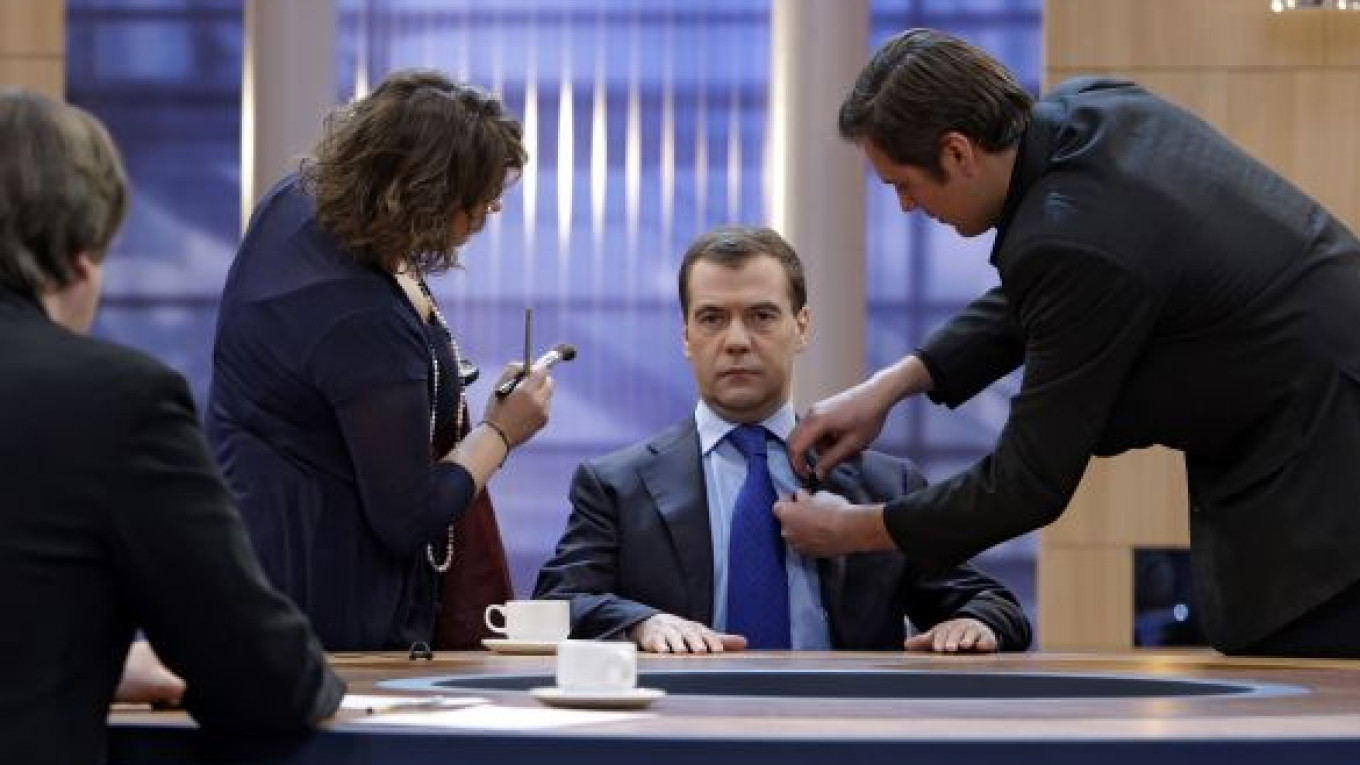President Dmitry Medvedev has ordered that the country’s police force be slashed by 20 percent and officers get pay raises as part of an effort to root out corruption.
But no senior Interior Ministry officials face dismissal, and the first major deadlines in the reform are 12 to 24 months away, suggesting that the measures are little more than an attempt to soothe public anger after a series of cases involving police brutality and corruption this year.
“Our citizens have accumulated a lot of claims about the work of the Interior Ministry,” Medvedev said in a televised interview with Channel One, Rossia and NTV television on Thursday.
“I’ll tell you one thing immediately: Today I will sign a decree to enhance the work of the Interior Ministry, and it will specify organizational changes and changes in certain financial and legal issues,” he said.
Medvedev’s decree, published on the Kremlin’s web site several hours after the interview, said the Interior Ministry must reduce its staff by 20 percent by Jan. 1, 2012.
But it does not specify from which level the cuts should made, theoretically allowing the ministry to hire many new recruits over the next two years and then make the personnel cut. For example, new Moscow police chief Vladimir Kolokoltsev ordered earlier this month that the number of patrolmen be increased by 30 percent because the current force was unable to handle all of the residents’ complaints.
The Interior Ministry currently has about 1.4 million staff.
An unidentified Interior Ministry source told Interfax that the cuts would largely come from positions that are already vacant. No one in the ministry’s press service could clarify the issue Friday.
A second plank of the police reform is to raise salaries, and Medvedev has given the government an entire year — until Jan 1, 2011 — to develop proposals on how to boost the pay of police officers, including with funds left over from the planned personnel cut.
The decree also calls for the Interior Ministry to disband two departments “in order to optimize the management.”
But it does not specify which of the ministry’s 15 departments should be closed. Last year, the ministry closed one department, which fought organized crime.
Interior Minister Rashid Nurgaliyev told reporters after Medvedev’s announcement that he would merge the transportation police department with the department overseeing security in restricted-access areas.
Medvedev also ordered the government to develop proposals by late March on how to finance patrolmen exclusively from the federal budget. Currently, some regions, including Moscow, co-finance the salaries of police officers.
Finance Minister Alexei Kudrin said Friday that the move would cost the federal budget 200 billion rubles ($6.7 billion) and that this money would be deducted from federal subsidies to the regions.
Perhaps the most controversial part of Medvedev’s reform is an order to Nurgaliyev, who has served as interior minister since March 2004, to develop a system of anti-corruption measures and an evaluation program for recruits within three months.
Calling on the head of what is arguably the country’s most corrupt agency to fight corruption within its own ranks is a bad decision, said Igor Trunov, a prominent lawyer and civil rights activist.
“The president should have started by establishing public oversight over the Interior Ministry’s activities. Without it, the whole reform will end up being a personnel reshuffle,” he said, noting that Medvedev’s proposals have never been offered for a public discussion.
But whatever personnel turmoil awaits the ministry, none of its key people or agencies will be removed, Medvedev said.
Saying that an “overwhelming majority of Interior Ministry officials are honest and dedicated people,” Medvedev said he was dedicated to “preserving the core of the ministry, which is capable of serious and responsible work.”
Nurgaliyev’s assessment of Medvedev’s reform, given in an interview to RIA-Novosti, offered a glimpse of the futility of the president’s hopes for the Interior Ministry.
“The suggested structural changes will in no way affect the effectiveness of the work of policemen,” he said, “but, to the contrary, will better help policemen perform their responsibilities of protecting the rights and liberties of citizens.”
A Message from The Moscow Times:
Dear readers,
We are facing unprecedented challenges. Russia's Prosecutor General's Office has designated The Moscow Times as an "undesirable" organization, criminalizing our work and putting our staff at risk of prosecution. This follows our earlier unjust labeling as a "foreign agent."
These actions are direct attempts to silence independent journalism in Russia. The authorities claim our work "discredits the decisions of the Russian leadership." We see things differently: we strive to provide accurate, unbiased reporting on Russia.
We, the journalists of The Moscow Times, refuse to be silenced. But to continue our work, we need your help.
Your support, no matter how small, makes a world of difference. If you can, please support us monthly starting from just $2. It's quick to set up, and every contribution makes a significant impact.
By supporting The Moscow Times, you're defending open, independent journalism in the face of repression. Thank you for standing with us.
Remind me later.


